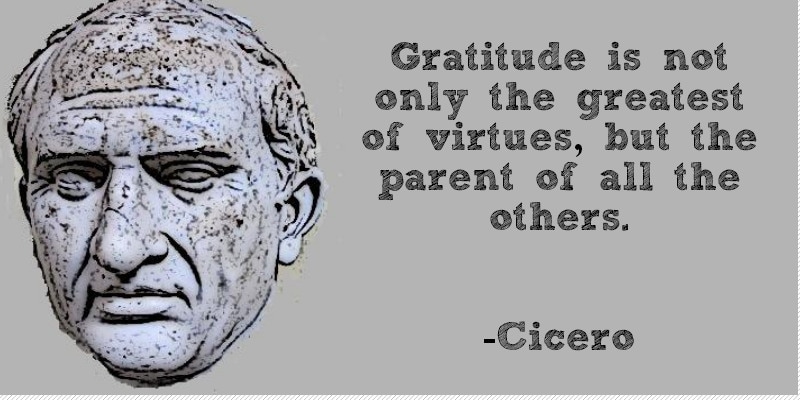"In truth, O judges, while I wish to be adorned with every virtue, yet there is nothing which I can esteem more highly than the being and appearing grateful. For this one virtue is not only the greatest, but is also the parent of all the other virtues."[1]
What does Cicero mean here when he says that gratitude is the parent of all other virtues? In the past, I have written about how having a grateful attitude can make you happier. Gratitude most certainly is a feeling of happiness or appreciation about benefits which you enjoy. But I doubt that Cicero saw gratitude as "only a stepping stone to personal happiness," to quote psychologist Robert Emmons.
In Pro Planico, Cicero sites the specific virtues arising from the positive feeling of gratitude, such as showing affection for one's parents, reverence, appreciation of friends, acts of kindness, and so forth. Gratitude often inspires us to do good things; this likely is what Cicero meant when he said that gratitude is the parent of all other virtues. Really it is fair to say that gratitude is both a happy feeling, and a behavior common to those of high moral standards. On the other hand, you are probably ungrateful if you do these 5 things:
In 54 BCE, Planicus won an election and was subsequently accused of electoral fraud by his opponent and prosecutor, Laterensis. Cicero was now in a position to both defend Planicus legally and also repay the debt of gratitude which he owed for Planicus' past kindness when he was in exile. Formal and informal favors played a large role in how the Greek and Roman world operated politically, and Laterensis naturally accused Cicero of having a conflict of interest, though he eventually lost the case he had brought against Planicus.[2]
So Cicero's motive for making the oft-quoted statement, "Gratitude is the parent of all virtues," was somewhat self-serving. He is trying to get around the appearance of having a conflict of interest in mounting his defense of Planicus. But that doesn't mean that he didn't believe that gratitude is an important virtue. He states similar things such as, “There is no duty more indispensable that that of returning a kindness,” in De Officiis (On Duties.)[3]
Here are the top 5 behaviors which make you an ungrateful person according to Cicero's criteria:
1. You Don't Thank People or Try to Repay Favors
Here, Cicero remarks on ingratitude for kindnesses received. You don't send a thank you card for an unexpected gift. You don't bother to show appreciation towards a relative for helping you with a project. Failures to acknowledge these types of small favors done by others give the appearance of ingratitude and rudeness, even if you actually are grateful for them. Cicero thinks that in order to be virtuous, we should avoid giving the appearance of being above acts of kindness.
2. You Take Your Country for Granted
This is not to say that your country or your government is perfect. (Rome certainly was not perfect in Cicero's day either. By our standards, the ancient world was a very violent place full of slavery and misogyny. Cicero was a staunch defender of the Republic and was assassinated by the soldiers of Mark Anthony). But at the very least, Cicero is talking about having gratitude for relative good. We should be grateful for the peace and stability which allows us to sit here now reading this, for example.
3. You Forget About The Chain of Kind Acts and Good Events Which Have Lead You to the Present
Here Cicero notes that most of us have been the beneficiaries of innumerable kind acts since birth. Our parents raised us, we were given food, shelter education, gifts, resources and so on. We have likely passed pleasant times in the company of friends and family.
Even if the present isn't great or you are going through something difficult, you probably have enjoyed many kind acts and good things during the course your life - this in itself is a blessing and something to be grateful about. Things could usually be worse than they are.
4. You Take Friendships For Granted
Friendships fade and eventually end if one or both of the friends takes the friendship for granted. Being a grateful friend means keeping up your side of things; calling or texting occasionally, remembering to send a gift or card, making plans when you can. Generally speaking, friendship is an exercise in fellowship. Without ongoing fellowship and mutual appreciation in any relationship, it will eventually falter.
5. You Don't Thank God For Your Blessings
The truly grateful person - even if they are not religious - has a sense of reverence for the good in their lives. Cicero is not saying that you have to go to church every week, but rather that you should continually give thanks to God for the many blessings which you enjoy.
Really there are innumerable things to be grateful for in life from the simplest to the most profound; a good cup of coffee, a happy marriage, peace, reason, food, employment, family, health, equanimity, the present moment. An attitude of deep reverence and appreciation just makes it easier to identify the good within us and in the world.
Sources:
1. Cicero. (1891).The Orations of Marcus Tullius Cicero, translated by C. D. Yonge. George Bell & Sons: London. 80-81.
2. Carr, D. (2016) Perspectives on Gratitude: An Interdisciplinary Approach. Routladge. 45-47.
3. Cicero. De Officiis (On Duties). Book i. 15 (47).
4. Cicero. (1891).The Orations of Marcus Tullius Cicero, translated by C. D. Yonge. George Bell & Sons: London. 80-81.
5. Ibid., 80-81.
6. Ibid., 80-81.
7. Ibid., 80-81.
8. Ibid., 80-81.
Note: References to Cicero omitted from this 2014 post and rewritten above, 1/2017.
~
You may also Like:
7 Behaviors That Lead to Lasting Happiness
5 Signs You Lack Maturity According to Cicero
The Secret to Happiness: Stoic Gratitude and the Art of Living










